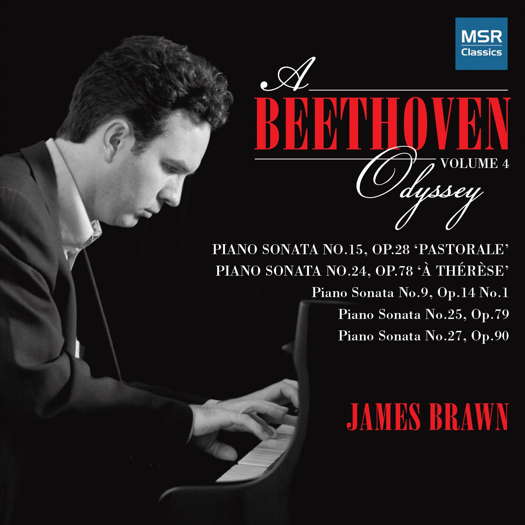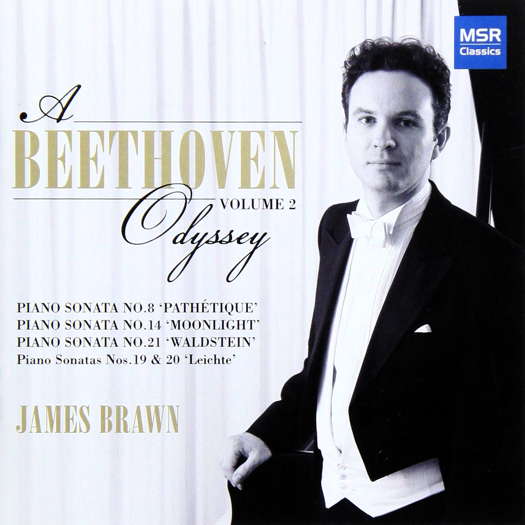 DISCUSSION: John Dante Prevedini leads a discussion about Improvisation in the classical world and beyond, including contributions from David Arditti, James Lewitzke, James Ross and Steve Vasta.
DISCUSSION: John Dante Prevedini leads a discussion about Improvisation in the classical world and beyond, including contributions from David Arditti, James Lewitzke, James Ross and Steve Vasta.
Invigorating, Appetising and Beguiling
RODERIC DUNNETT discovers Giuseppe Gazzaniga's 'Alcina's Island' at Bampton Classical Opera
Year on year, Bampton Classical Opera in west Oxfordshire remains one of England's unmissable musical delights.
Why so? Its scintillating, quirky productions take place - are celebrated - in Bampton's enchanting Deanery Garden. As outdoor locations go, that is one of the most charming venues you could ask for. Impressive, capacious box hedges fronted by the compact performing platform provide a major bonus: a vivid backdrop which contrives splendidly to project the solo and ensemble voices to an enthusiastic and supportive audience. The setting is invigorating, appetising and beguiling.
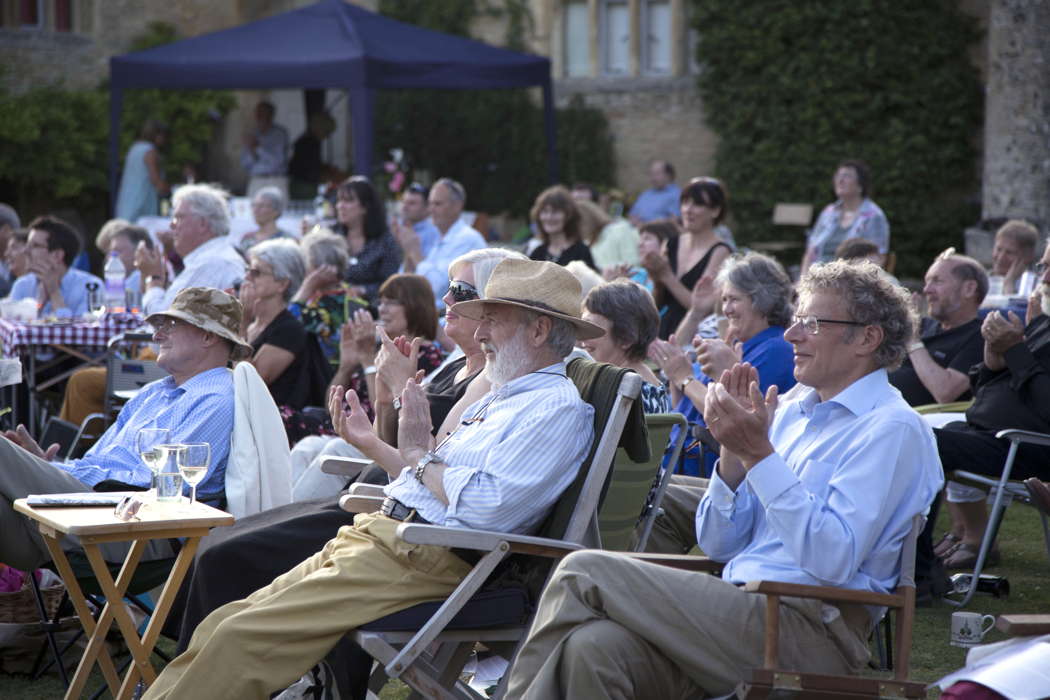
Bampton's Deanery is the ideal venue for summer garden opera. More often than not, the sun actually shines. In the foreground, baritone Henry Herford, a celebrated Bampton aficianado. Photo © 2014 Anthony Hall
True, unusually in the high summer of July, there is a danger of rain - even occasionally a real downpour. In that rare case, the opera gets skilfully and neatly shifted into the adjacent - superb and dominant - St Mary's Church. But that move of a production can never match the allure of an arresting outdoor performance, with its magical, intriguingly designed and manufactured sets. And Bampton, against all odds, has a blessed gift - a knack, perhaps - for conjuring up dry evenings. Even this year, an unnerving threat was averted. Umbrellas had scarcely begun to surface before a mere three minutes of drizzle having threatened, immediately ceased. The whole remainder of the evening was joyous: as dry as a bone.
Bampton's essential and deeply valuable commitment to promoting young performers is one of its major achievements. Not only by a commendable process of selection does it draw into its ranks cast members, and indeed orchestral players, all performers of notable talent, range and versatility, excellently honed. It has also contrived over the past few years a Young Singers competition which has quickly established itself as a strikingly high quality opportunity for ambitious young aspirants. By general consent its standards have been exceptional. To prove its value, winners and runners-up have emerged from not just Britain, but from Eastern Europe, the Far East and across the world. The standards have consistently proved phenomenal. It is a stupendous achievement.
As for Bampton's unfailingly entertaining, ticklish, invariably mind-boggling productions, if one wanted to sum up their stagings' bizarre character, the first word that comes to mind would certainly be 'fun'. The imaginative and immensely capable founders, full of initiative, the ingenious husband and wife team of Jeremy Gray (who directs all Bampton's productions with endless wit and aplomb) and Gilly French, whose always clever English translations are hilarious and - as important - unfailingly loyal to the original text, have shown that comic operas by Haydn or Gluck, Cimarosa or Salieri - if skilfully managed and artfully staged - can yield an extraordinary, insuppressible wealth of entertainment. Often their shows are a laugh a minute. A treat in every way.
So what is the character, the salient feature of Bampton productions? There is a definite house style, one might call it. Not just fun, but naughtiness and cheekiness; impudence; a wicked dose of mischief. A lot of flair, even daring; heaps of creativeness and invention; plenty of vital and vivid ways of capturing - prising out - the comedy and sharp wit of the usually outrageous plots they have the imagination to serve up. Special, one might say unique, ways of teasing and tickling their audiences. An unrivalled gift for the unpredictable, the roguish, the improbable, and endlessly captivating.
And now, enter Gazzaniga. Who, you may ask? Giuseppe Gazzaniga lived from 1743 to 1818. Plenty of time there to be prolific: indeed some fifty-one operas flowed from his busy pen. One of the best known was his Don Giovanni, which Bampton - with its unique gift for spotting and promoting Classical era operas that have long fallen out of the repertoire - has staged, filled with its typical energy and zest.
Now it has made a cheerful and rumbustious revisiting of this needlessly neglected eighteenth century composer, staging yet another rarity, L'isola d'Alcina (Alcina's Island), originally staged in 1771 and based on a section of the epic poem ('verse-novel') Orlando Furioso - written some three centuries earlier by the versatile, polished and hugely celebrated Italian poet Ludovico Ariosto (1474-1533).
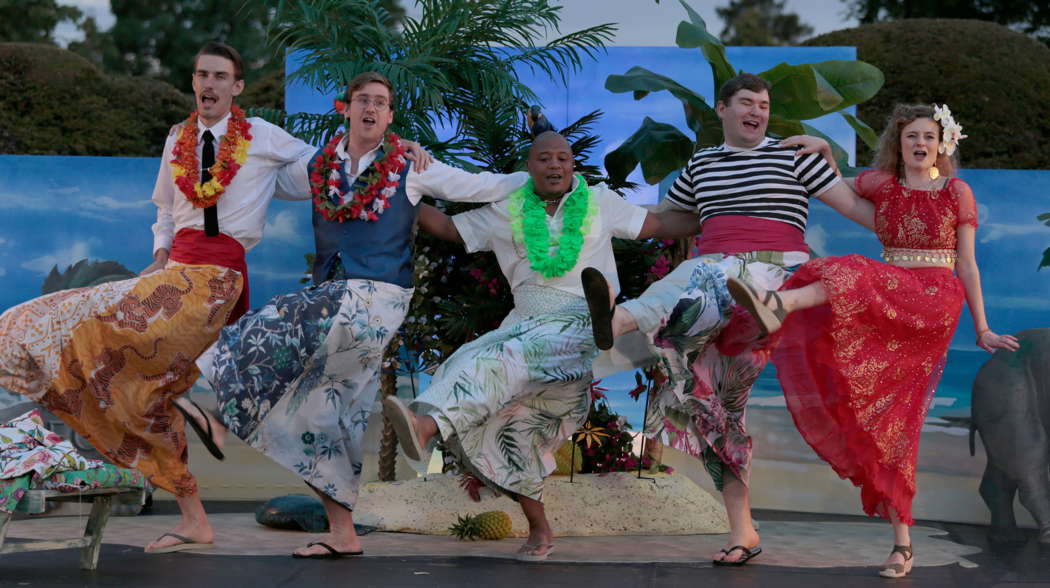
Don Lopes, James, Brunoro, La Rose and Clizia, in Gazzaniga's L'isola d'Alcina at Bampton Classical Opera. Photo © 2024 Anthony Hall
Not least important in this case is that the scampering libretto of this fast-moving opera was devised by Giovanni Bertati (1735-1815), one of the most significant figures of his time, one well versed in the style of the famous and productive fractionally older Carlo Goldoni (1707-93). Bertati contributed to numerous different composers, including furnishing the still popular Il matrimonio segreto for Cimarosa, texts for Paisiello, Anfossi and Traetta, and a clutch (Calandrino, La locanda, plus the intriguingly titled La Tomba di Merlino), as well as the present cleverly mapped L'isola d'Alcina for Gazzaniga. Alcina, of course, was also one of the most impressive and popular of Handel's operas. Outrageously, it's said that elements of his Don Giovanni tenorio (1787) were 'stolen' - pinched - by Da Ponte the following year for the premiere in Prague of Mozart's opera - which dated from the very next year.
L'isola d'Alcina's plot, Jeremy Gray points out, is 'especially absurd'. But no worry - it's very much up Bampton's street, the kind of hyperactive, hugely amusing extravaganza at which Gray invariably shines and excels. Before one further explores the contorted plot, and his typically zany production, one must pay the highest tribute to the conductor. Thomas Blunt has conducted almost half a dozen of Bampton's stagings. His prodigious talent, overwhelming insight, meticulous command of detail and insistent conciseness stood out a mile.
Blunt's immense precision communicates itself - rubs off successfully - upon his notably polished orchestral players, producing a similar vital quality from them. A notable gift for switching from gleeful alacrity to hushed restraint had the result that the contrasts he evolved from the music were consistently inventive and well drawn.
To be honest, Gazzaniga's score is much more akin to Haydn than to Mozart: in short, it certainly lacks the originality of the latter: the recitative flows, but arguably even a couple of his arias feel fractionally pallid in places. Yet Blunt produced from them all a wealth of nuance and refinement, eliciting from it solo instrumental touches that might easily have been let by and passed over. He found subtlety where it was needed, drew out detail when it was badly needed, and held together an admirable ensemble which gave vital but finely judged support to the vocal soloists, especially in the many ensembles that form such an essential element of the vocal soloists' unfailing vigour and energy.
If the plot is zany, it nonetheless needs energy and vitality to keep the story, with its addled collection of Spaniards and Frenchmen, Italians, Britons (as well as a wild German) who are washed up on a Pacific island, interact with each other quite hectically and in fact find themselves in the grip, unwillingly, of a manipulative sorceress much like Odysseus's Circe. She determines to lay a hand on any or all of these unlikely castaways. They collude to resist her but ... well ... the lady is not without her attractions, and vulnerably they begin to yield to unfortunate temptation. But as the peril becomes apparent they begin to perceive the danger. Instead, they - or one of them, the German - has the wit to find a way to diminish or neutralise her powers. To her utter fury, the sorceress's power is overthrown. She will not have any more victims after this.
If Bertati's plot is pretty banal, the one thing that gives it such zip and flair, as it does time and again - is Gilly French's translation. Time and again, it's her ingenuity which makes the story come alive. The chances are that her version is wittier, more inventive, more scrumptious, incisive, even more electrifying, than Bertati's sometimes limping original. Here are a few examples.
'Shake ... mistake; malicious ... suspicious; curtain ... certain; frighten ... enlightened'; 'I know nothing! I'm not bluffing!' There's loads more. 'Affection ... under my protection; favour ... savour; bother ... another; rigmarole ... self-control; loathing ... proposing; smiling ... beguiling.' Time and again smart phrasing appears: 'refresh us ... enmesh us; you appear somewhat dazed ... Gods be praised. What must our womenfolk be thinking ... I can hear the glasses clinking.' And lots more. The cleverness of these annual English libretti, marvellously fresh, alive and adroit, here gives the story its zest, nippiness and unceasing vigour. Her texts and revitalising of eighteenth century comic scripts - often irresistible banalities - are masterpieces in themselves.
If the two-line rhyming is ingenious, she is endlessly gifted at bringing whole stanzas to life, a cluster of lines which capture the spirit of a passage inspiredly, subtly and perfectly.
The story is as addled as mentioned above, but of course there are names - the team of singers - to celebrate. Surely first of all is Sarah Chae, a quite delicious soprano with beautfully eloquent touches of coloratura (as much as Gazzaniga allows her) - really finessed and enticing at every point. Both she and Charlotte Badham, who also held forth her own nicely coloratura-tinged arias, shone brightly: both were definitely a hit, and where needed acted capably - even though, inevitably, it was Alcina herself (Ukrainian Inna Husieva) who held the stage, lolling bossily and seeking to direct the fortunes of all.
The four perspiring suitors - or victims - cavorted in inimitable Bampton style: if one had a few reservations about their individually crazed, dotty if marginally cramped interactions, all sported utterly ridiculous costumes, capturing intriguingly the contrasted nationality of each. Where they excelled was not least in the neatest aspect of Gazzaniga's setting. Initially not one but two quartets (as they successfully escape then discover their unexpected landing on this weirdly unknown land, and utterly puzzled, come to terms with the strange ambience of where they have ended up).
But also a quintet - Act II - plus vibrant septets which draw each Act to a typically cheerful close. The essential aspect at these points is that - thanks to Blunt's careful nursing - they are artfully balanced, that the singers were never outweighed by the orchestra, or indeed vice-versa. The diction was excellent. But the singers, male and female, Alcina's pair of maidservants and the bizarre foursome showed considerable intelligence and, importantly, a smart degree of individuality - these are Bampton characteristics - they gather up young singers, offer them a chance on the professional stage, and lend to them a degree of polish that will enhance their singing and acting in any other company they may aspire to join therafter.
Of course there are solos - in fact solos galore, richly carried off. Early on, as mentioned, the two girls, Clizia and Lesbia, 'Oh what joy', are allotted gems.

A moment of doubt for Lesbia (the wonderful Sarah Chae) and her spirited companion Clizia (Charlotte Badham) in Gazzaniga's L'isola d'Alcina at Bampton Classical Opera. Photo © 2024 Anthony Hall
Then one after the other, mostly in turn, the various foreigners break into song. A striking aria from the grandiloquent, bizarre-hatted Spaniard (Don Lopes - Jonathan Eyers), who is very ready for a fight and an argument; by contrast the Italian, Brunoro (Monwabisi Lindi), who furnished an enchanting, beautifully restrained, exquisitely characterised tenor aria, 'Love and honour', was notably plaintive and touching. There was a complementary Englishman (Magnus Walker), who deftly intermingled with the other three, and proved full of allure in his solo 'If you love me ...'.
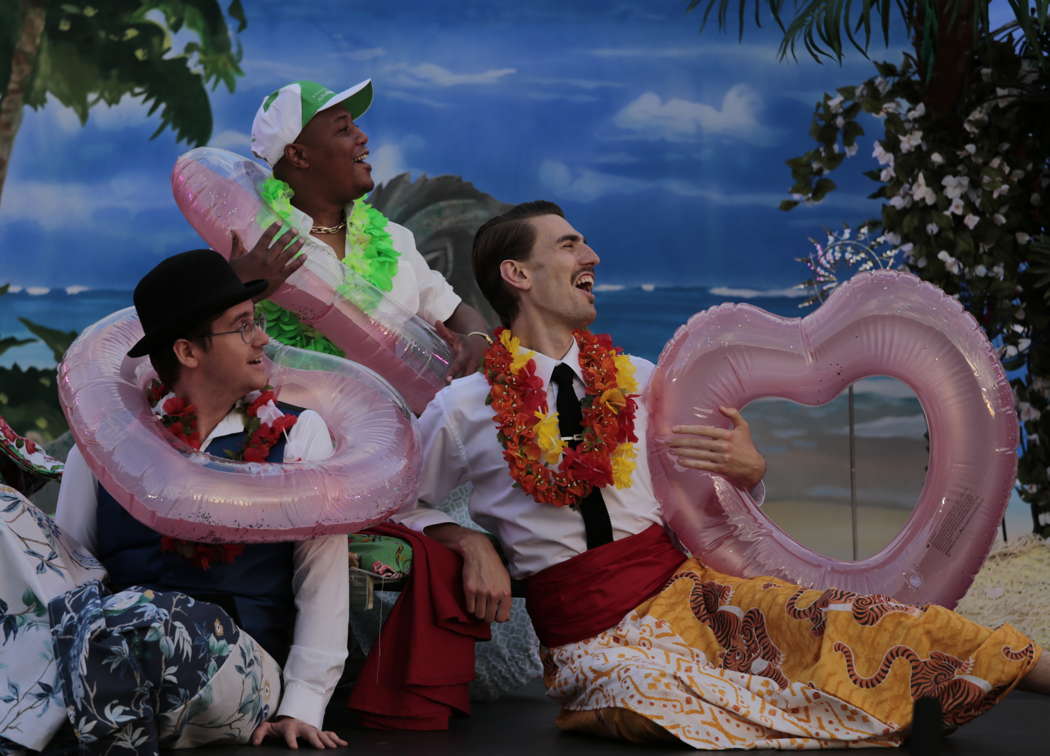
A lot of fun - James (Magnus Walker), Brunoro (Monwabisi Lindi) and Don Lopes (Jonathan Eyers) in Gazzaniga's L'isola d'Alcina at Bampton Classical Opera.
Photo © 2024 Anthony Hall
And - significantly for the plot as it turns out - a shambling German, curiously named 'Brikbak', who by some magic device is the one who successfully breaks the power of Alcina: the sorceress, or enchantress, is not, it turns out, insuperable.
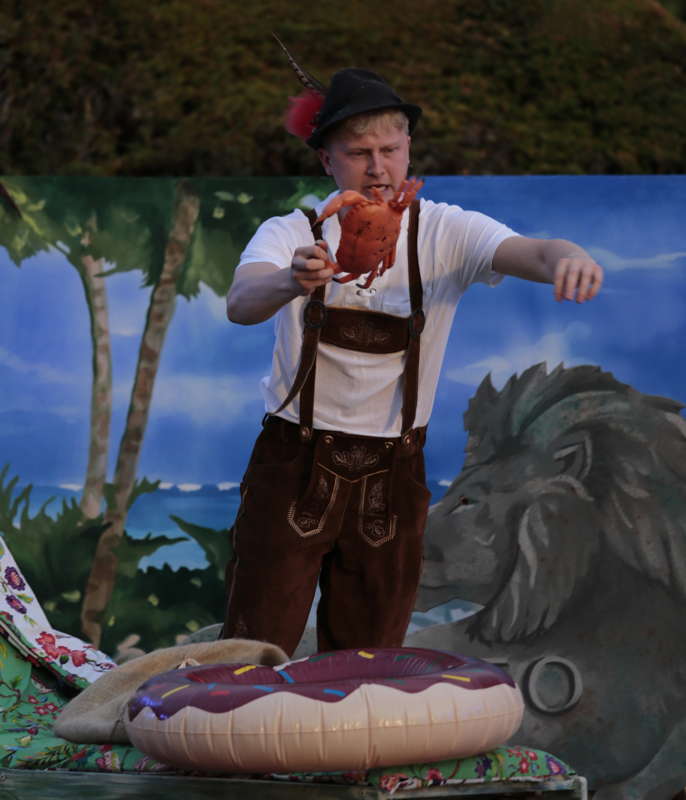
The crazy German Brikbak (Owain Rowlands).
Photo © 2024 Anthony Hall
But easily the most impressive, and absorbing, of the four characters, was the Frenchman, La Rose (Dafydd Allen), particularly eager to be the one who carries off the lady ('A la charmante' ... 'Ah, monsieur') whose exquisite delivery and truly beguiling voice and attractive lucid delivery sparkled above all else. This was a voice, and a personality, which shone at every juncture. Superb character, irresistible features, and real beauty. Another triumph for Bampton, especially as, due to a mishap, he was only recruited a fortnight before the staging. You'd never have guessed it; every move and gesture fitted the story.
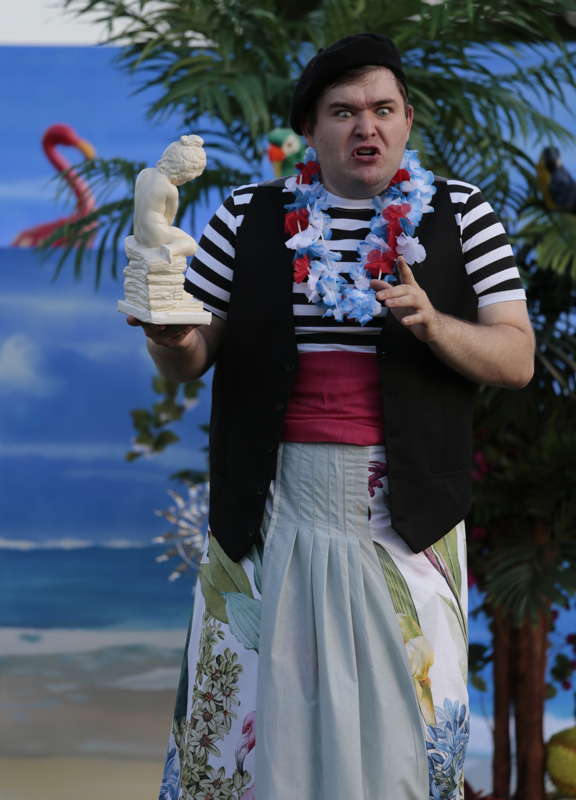
Dafydd Allen as the unforgettably
determined Frenchman, La Rose.
Photo © 2024 Anthony Hall
Of course Alcina (Inna Husieva, originally from the Ukraine) is the central character, and is onstage a good deal of the time, ruling the roost, weaving her spells and exercising her charms to entice the men into her net. Her enchanting Cavatina ('I am Alcina, a classical beauty') is just one of her wonderfully compelling moments. She's self-admiring, confident in her powers, and in her talent and allure for drawing men of every hue and colour into her wiles, and to masterfully and wickedly control them. She takes delight, but then perhaps inevitably finds growing boredom in these essentially clueless characters.
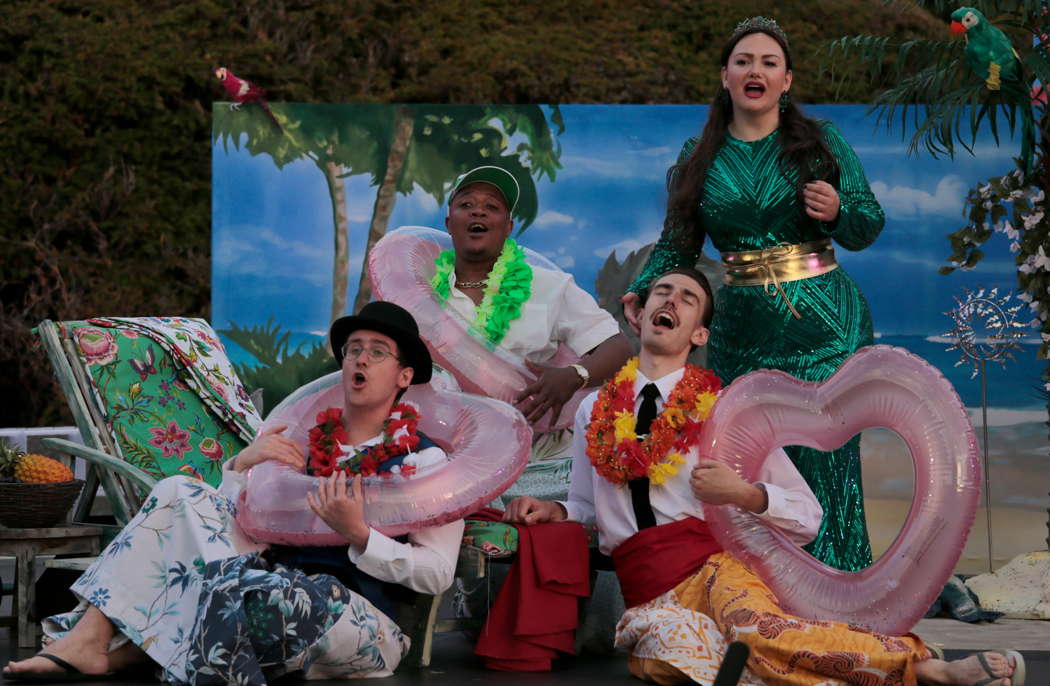
General chaos - The Englishman James (Magnus Walker), the splendidly characterful, beautifully voiced Italian Brunoro (Monwabisi Lindi), the wildly enthusiastic Don Lopes (Jonathan Eyers) and (above) Alcina (Inna Husieva) trying to keep control, in Gazzaniga's L'isola d'Alcina at Bampton Classical Opera.
Photo © 2024 Anthony Hall
So - another big hit for Bampton? As always, in its own very special idiomatic, crazy way, yes, certainly. Bampton exudes joy, revels in the unexpected, seizes every enterprising opportunity for teasing, captivating, invigorating. What an exceptional place to stumble across any mid-July.
Copyright © 6 August 2024
Roderic Dunnett,
Coventry UK



